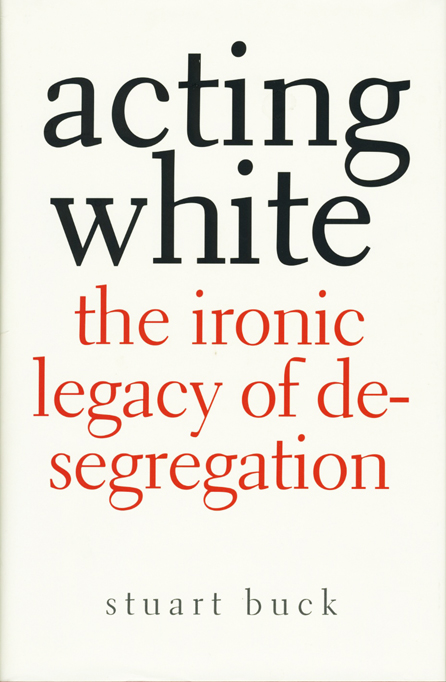Acting White: The Ironic Legacy of Desegregation
FAYETTEVILLE, Ark. – The use of “acting white” as a criticism of high-achieving black students is a social phenomenon with deep cultural roots. Acknowledging its power over student achievement is a critical first step for moving forward, according to a new book by University of Arkansas researcher Stuart Buck.
Previous research has shown that some black children have thought of doing schoolwork as “acting white” since the 1960s, and a recent study shows that black students with higher grades lose popularity. Buck links the rise of that attitude to desegregation in his book Acting White: The Ironic Legacy of Desegregation, published by Yale University Press.
“Desegregation undermined one of the traditional centers of the black community: the school,” Buck wrote. After many black schools were closed and their students were dispersed into formerly all-white schools, “black schoolchildren, for the first time, faced the possibility of seeing ‘school’ as a place where success equaled seeking the approval of whites.”
Before desegregation, the authority figures and role models of black students were also black, and the best students in black schools were black as well. But in newly integrated schools across the South, black teachers and principals were often fired or demoted, and many black children were placed under the authority of white teachers and principals who disliked them or underestimated their abilities. Black students who had led extracurricular clubs, played on teams, acted in plays and campaigned for student government at all-black schools lost opportunities to lead or participate in integrated schools.
Academic tracking of students by ability was often used to keep the better-prepared white students in a separate class from the black students, “reinforcing the message that ‘academic achievement is the province of whites’,” Buck wrote.
Buck says that the “acting white” phenomenon is a normal human reaction common to any minority group. People usually expect loyalty from their fellow group members, and often resent a dissenting member of their own group even more than a complete outsider.
“Acting white” is a complex problem, and Buck offers a few suggested education reforms as starting points.
First, “it may be the case that some students would thrive if allowed to choose an all-black environment that includes black teachers and principals,” Buck wrote. “For many black boys in America, seeing a black male teacher or principal could be the only time they ever see someone like themselves in a position of authority and success.”
He also suggests expanding the effort to recruit blacks — especially black males — into teaching. This could include privately funded scholarships and efforts aimed at encouraging black males to study education.
Next, school boards should consider hiring teachers without strict certification requirements. Buck says the certifications tend to keep out black teachers who would otherwise do a good job. A recent study found that “while black teachers had lower licensure test scores, black teachers were so much more effective with black students that ‘black teachers in the lower end of the teacher test distribution are estimated to perform at approximately the same level as white teachers at the upper end of the distribution,’” Buck wrote.
Finally, a more radical idea proposed by Buck is to eliminate individual grades and let students compete against other schools in academic competitions. Then the students would have an incentive to encourage their fellow classmates to study hard and take pride in their peers’ academic successes. This structure fosters an attitude toward education similar to the spirit of athletics, allowing the victories of high-achieving students to be celebrated across all academic levels.
Buck is a Distinguished Doctoral Fellow in education policy in the College of Education and Health Professions at the University of Arkansas. Acting White: The Ironic Legacy of Desegregation is available locally at the University of Arkansas Bookstore.
Topics
Contacts
Stuart Buck, doctoral candidate in education policy
College of Education and Health Professions
479-575-4439,
jsb003@uark.edu
Lana Hazel, communications intern
Unviersity Relations
479-575-5555,
lhazel@uark.edu
Barbara Jaquish, science and research communications officer
University Relations
479-575-2683,
jaquish@uark.edu
Headlines
PetSmart CEO J.K. Symancyk to Speak at Walton College Commencement
J.K. Symancyk is an alumnus of the Sam M. Walton College of Business and serves on the Dean’s Executive Advisory Board.
Faulkner Center, Arkansas PBS Partner to Screen Documentary 'Gospel'
The Faulkner Performing Arts Center will host a screening of Gospel, a documentary exploring the origin of Black spirituality through sermon and song, in partnership with Arkansas PBS at 7:30 p.m. Thursday, May 2.
UAPD Officers Mills and Edwards Honored With New Roles
Veterans of the U of A Police Department, Matt Mills has been promoted to assistant chief, and Crandall Edwards has been promoted to administrative captain.
Community Design Center's Greenway Urbanism Project Wins LIV Hospitality Design Award
"Greenway Urbanism" is one of six urban strategies proposed under the Framework Plan for Cherokee Village, a project that received funding through an Our Town grant from the National Endowment for the Arts.
Spring Bike Drive Refurbishes Old Bikes for New Students
All donated bikes will be given to Pedal It Forward, a local nonprofit that will refurbish your bike and return it to the U of A campus to be gifted to a student in need. Hundreds of students have already benefited.





